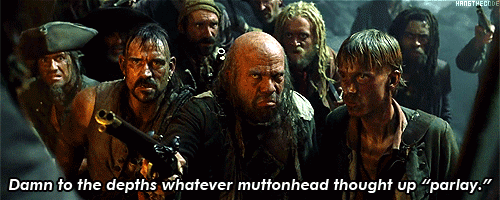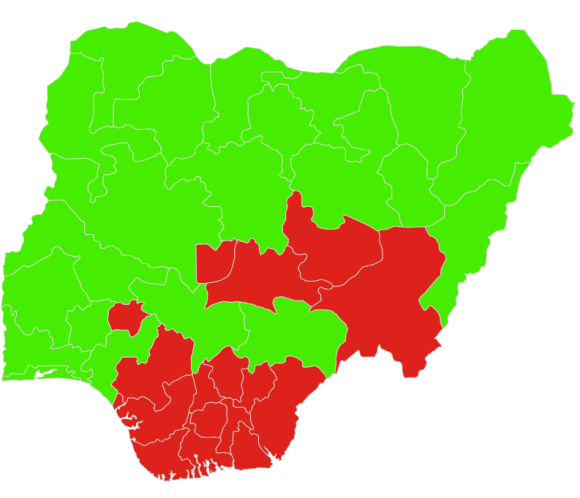Watching Trump’s takeover of the Republican Party and the subsequent capitulation of even the most hardcore conservatives has been an amusing, if depressing, experience. As someone who sat through Obama’s presidency and heard numerous “sensible” justifications for their opposition to everything he did, ranging from classics like small government and fiscal conservatism to mind-bogglers like religious freedom, it’s been very interesting to watch how Trump openly flouted many of these pillars of modern conservative philosophy and didn’t just manage to win the nomination but also got more people to turn out for him than his last two predecessors.
The reason for this, as far as I can tell, is that these supposed Republican ideals are nothing more than window dressing, pretty paint over a broken house that hides the fact that the modern party is an unholy marriage of completely disparate philosophies, united only in their desire to stop progress on a meaningful scale for a lot of people.
Now I’m not saying that the people that make up the party are cruel, immoral and evil, possessing no regard for the plight of their fellow man. No. Some of them, I assume, are good people. I’m not even saying that there is something wrong with those that subscribe to all the vaunted ideals of modern Republicanism, though I’m very interested in picking their brains. Mine is a critique of the people that manage the party, the Leadership as they are called, and how their blind quest to undermine the previous president, coupled with what one might assume is a genuine belief in conservative principles, led to the terrible state of affairs we have today.
Nothing I think illustrates my point better the debate over Obamacare. There have been a lot of issues I personally believe the Republican Party has chosen the morally wrong (and sometimes factually incorrect) position on, but Obamacare holds a special place in my heart. This is probably because the debate began shortly after I arrived in the U.S., wide-eyed and politically ignorant, and watching it play out played a huge part in shaping my opinions of both parties.
Imagine for a moment that you are a dyed-in-the-wool fiscal conservative: small government, unfettered capitalism, freedom, rah-rah-rah. You don’t really believe in all this religious conservatism nonsense, but in order to advance your agenda you’ve had to make your bed with the homophobes and anti-abortionists. This is fine because if your dreams do come true, if capitalism is given the adequate rein that you want it to be given, then the gay people won’t even need the tax benefits that marriage brings, and those that want abortions would be able to afford them regardless of all the stupid restrictions your party has placed upon them.
Now a dark man with large ears comes in and wants to implement health care for the masses. This goes against everything you’ve ever believed in. It’s an expansion of government. It curtails the powers of the free market, both the producers (insurance companies) and their consumers (the populace at large). It forces people to purchase a(n expensive) product and fines them if they choose not to. This is the very epitome of everything you stand against. So you decide to go to war.
There are a bunch of strategies you can employ. The uber-religious will obviously be against it, because forcing them to provide insurance would inevitably force them to provide coverage for things they hate, like contraceptives and abortion, so you enlist them. The true small-government folk like you will hate the law by default, so you won’t need to do much convincing to get them on your side. But the rest of the country, especially those that are old or sick or know people who are old and sick, will clearly be ecstatic at the chance to reduce their insurance costs, so you have to get them on your side somehow.
This is where the political games come in. A good chunk of them are overtly racist, so the fact that Big-Ears is black automatically gets them on your side. A good chunk of them believe in the “concept” of freedom (I say concept because they are perfectly willing to sign it away when the brown people attack their monuments, or the black people criticise their policemen), so all you need to do is emphasise that this will take away their freedoms and you have them. A good chunk of the more low-key racist people have been screaming “State Rights” ever since their ancestors lost the Civil War, and then lost the segregation war, and then the affirmative action war…, and so all you need to do is tell them that the federal government is doing this and BOOM they’re against it too. Note that apart from the religious companies (not people, though in America they like to think they’re the same thing) and the true small government nuts (who incidentally are usually privileged and rich) everyone else in these chunks stands to gain immensely from nationalised, subsidised healthcare. But it doesn’t matter because you’re able to leverage all these prejudices to get them on your side. If you have a heart you can use the justifications I mentioned before to soothe your soul and help you sleep at night. You probably already do that anyways.
Against all odds Big-Ears gets his law passed. But he won’t be president forever. So day after day, month after month you whip your people into an angry frenzy, demonising everything you possibly can about the law. Some people’s premiums go up? The law is bad. Insurance companies pull out? The law is bad. Some people are forced to change their doctors? The law is bad. Never mind that these are all different issues. Premiums were going up before the law, and went up at a slower rate after the law. Bad. Insurance companies pulled out because not enough (healthy) people signed up, a side effect of an admittedly less than stellar roll-out. Bad. People lost their doctors because of the insanely byzantine network system of insurance companies and hospitals that existed before the law, which the law didn’t really try to change. Doesn’t matter. Bad.
Note that none of these things is the fault of the law per se, and all can be fixed without repealing the law. Also note that millions of Americans got affordable health insurance for the first time and this is an objectively good thing. None of these things matter. When absolute destruction is the goal any tool will do. The law is bad. It must go.
Everything seemed set. Your people hated the law, they were begging you to get rid of it, and Big-Ears was about to leave office in a few months. But then an extremely tanned golden haired narcissist rode in and ruined all of it. You see he realised what you have been too scared to admit this whole time: that your allies aren’t really yours. Because you spent your career demonising everything your opponent did, with no regard for what you were demonising or why, you attracted a lot of people that didn’t really care about true conservative issues. The racists already hate non-white people. The religious already hate gay people and Muslims. These people don’t really care about free markets. They don’t care about real freedom. They just stuck with you because you used those things to get them to vote for you. It wasn’t even that difficult, to be honest. The people they hate – the gays and the Muslims and brown people – already liked Big-Ears so getting them to automatically hate him too didn’t require particularly strong arguments.
But these people also like having health insurance. They like having well-paying jobs. They like having benefits and extra money to spend after paying off their expenses. They don’t care that these things come from larger government. They only stood against big government because that was the guy helping the blacks and the gays and the browns. And so they listened to Tan-Man when he promised them all these things and hated on the blacks and the gays and the browns. The fact that he said openly racist things didn’t put them off; it energised them. Finally here was a man that was not afraid to couch things in politically incorrect messaging. He said what they were thinking like they were thinking it. He said it like it is.
To your dismay Tan-Man hijacked your party and won. And now the people want everything he has promised, starting with better health care. Suddenly you can’t just do what you’ve been planning all along: repeal the law and restore the free market to it’s rightful place at the top of the insurance mountain. Your people expect a replacement that is better in EVERY way. That’s why it’s been 2 months and you still haven’t repealed the law even though you symbolically did so more than 50 times in the past 4 years.
Even more worrisome, Tan-Man is also overstepping his bounds. His first month has been an administrative and political mess. His most famous executive order has been stopped dead in its tracks. He spends more time watching cable news and golfing than governing. He openly lies about easily verifiable facts. He insults the press and castigates the people that march against him. These things are all abhorrent to you. After all you just like the free market; you’re not a racist nationalist anti-free-press monster. But you can’t stand against Tan-Man. All the people that voted for him also voted for you. And they love him. If you’re not with him you’re against him, and that means you’re the enemy. All that clout you’ve built up across decades means nothing if you can’t get re-elected. That utopic free market you seek? Impossible if you’re not there to shepherd it into the limelight.
So you have to keep silent. You have to watch as his conflicts of interests multiply, as his travel expenses for a single month match those of his predecessor for a whole year, as rumours about the involvement of a rival nation-state in your government grow. You have to wait, at least until the very people that love him start to turn against him. Hopefully that can happen before you need to run for re-election. That way you can make a big show about bringing him down and your people can remain with you. And if that never happens, well this is your life now. You decided to ride the beast and now you have to go wherever it leads. After all, how were you supposed to know that exploiting nothing but the fears and prejudices of the people would lead to this sort of mess?
N.B: John Oliver and Vox both have excellent videos that go deeper into Obamacare and the opinions of many Trump voters concerning the law. They’re worth watching.
Image Credit: Cagle.com












